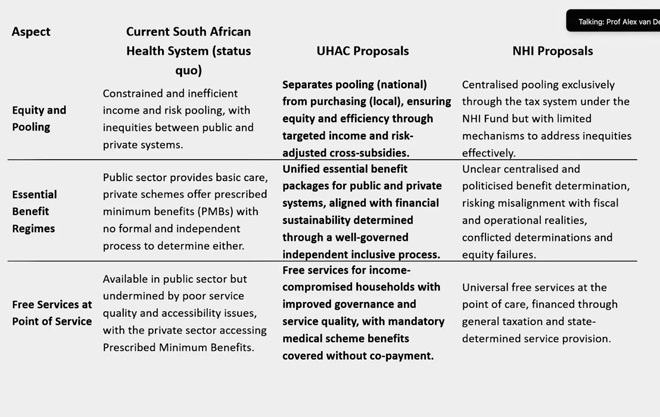This story was originally published by Health-e News.
The Universal Healthcare Access Coalition (UHAC) argues that the National Health Insurance (NHI) model is fiscally and institutionally unfeasible, stating there is no scenario in which a single, tax-financed fund can provide full medical coverage for the entire population.
In its current form, the NHI fails to address the critical issues of governance in the public sector and equity in the private sector, the group claims.
Instead, the coalition – which is made up of health professions associations, healthcare funders, and advocacy groups – proposes a “balanced, feasible, and sustainable pathway to achieving universal health coverage in South Africa”.
Professor Alex van den Heever, Chair of Social Security Systems Administration and Management Studies at Wits University who is also part of the coalition, says South Africa’s healthcare system is polarised, with an underperforming public sector which caters to 84% of the population and an expensive private sector that caters to 16% of the population.
“UHAC addresses these issues by improving governance in the public system. The coalition addresses governance failures by separating political influence from healthcare management through independent supervisory boards. This would improve accountability, reduce corruption, and enhance service delivery efficiency,” he says.
Subscribe to the Health-e News weekly newsletter.
The issue of high costs in the private sector would be addressed “by regulating the sector for cost efficiency and equity through targeted subsidies for low-income groups and prioritising those most in need while allowing higher-income groups to contribute through regulated contributory schemes”, said Van den Heever at a press conference on Wednesday.
To this end, the coalition suggests that medical scheme membership be mandatory for higher-income groups, instead of what’s currently stated in the NHI Act, that medical schemes will not be allowed to cover the health services included in the NHI benefits package.
“The UHAC proposes tax-funded free services for the poor and contributory insurance for higher-income households. There should be free services for income-compromised households with improved governance and service quality, with mandatory medical scheme benefits covered without co-payment,” he says.
The proposal was jointly developed by the South African Medical Association (SAMA), the Progressive Health Forum (PHF), and the SA Private Practitioners Forum (SAPPF).
The role of medical aids
The issue of what becomes of medical aids under the NHI is a contentious one. On 5 February, News 24 reported that an informal agreement was struck between the DA’s Minister of Agriculture John Steenhuisen and Health Minister Dr Aaron Motsoaledi stating that medical aids would not be phased out.
However, Motsoaledi refuted these claims during an interview with Talk Radio 702, saying there is no provision in the NHI legislation that mandates the phasing out of medical aids.
“What the Act says is that once the NHI is fully implemented, which will happen after many years, medical aids would be complementary. This means medical aids and NHI cannot be allowed to pay for the same service. It won’t make sense and would make the healthcare system extraordinarily expensive,” Motsoaledi says.
The coalition also proposes a publicly sponsored medical scheme that people can choose to contribute to, instead of a private scheme, which would enhance competitiveness and affordability in the sector.
Mixed funding model for long-term sustainability
The NHI Act lists general taxes, payroll tax, and medical scheme tax credits among its sources of funding. Dr Mvuyisi Mzukwa, chair of the SAMA and a member of the UHAC steering committee, says the coalition’s proposal includes a mixed funding model that combines medical scheme contributions with general taxes, along with some realignment of existing taxes.
The mixed funding approach instead of a single tax fund, he says, better aligns with South Africa’s fiscal constraints and ensures the long-term sustainability of the healthcare system.
“The NHI does not materially address the weaknesses which include governance failures, inadequate service delivery and inefficiencies in both public and private healthcare of the current system but instead centralises control without resolving fundamental problems,” says Mzukwa.
Van den Heever explains that the current system includes a mix of general taxes and private medical schemes, while the NHI places the entire burden of Universal Health Coverage (UHC) on tax finances, excluding the private contributory system.

He adds that an effective system of universal access and coverage in South Africa cannot be exclusively financed by general taxes in any foreseeable fiscal scenario.
“The health system requires an institutional design that relies on both tax funding and the contributory system. It is also recognised that tax-financed and contributory systems work differently and require well-functioning, distinct governance frameworks,” he says.
Alternative to NHI
Dr Simon Strachan, chief executive of the SAPPF, emphasised that the NHI focuses solely on healthcare funding, while the UHAC approach introduces multilateral tariff negotiations, independent regulation, and competitive alternatives to address rising costs in the private sector.
“These solutions are more targeted and nuanced than the NHI’s reliance on centralised purchasing,” he says.
The coalition suggests that healthcare funding (including taxes and medical scheme contributions) and risk management be pooled at a national level to ensure the equitable distribution of resources. This, according to the coalition, will be done by separating income and risk pooling and localising purchasing functions.
The coalition believes that its proposal would allow the government to implement practical solutions that are both supported by the public and aimed at meeting their needs for affordable, accessible healthcare.
They say the proposal offers a strategic focus on a health reform approach that can guarantee universal access to healthcare. The coalition says the proposal was presented to President Cyril Ramaphosa, who referred it to Motsoaledi.
“There has been no response from either. This is the health system talking to the government, and at some point, the government will have to listen. It doesn’t necessarily require the government to immediately accept everything that is proposed,” says Van den Heever.
The Department of Health did not respond to Health-e’s queries. The story will be updated once a response is received.




